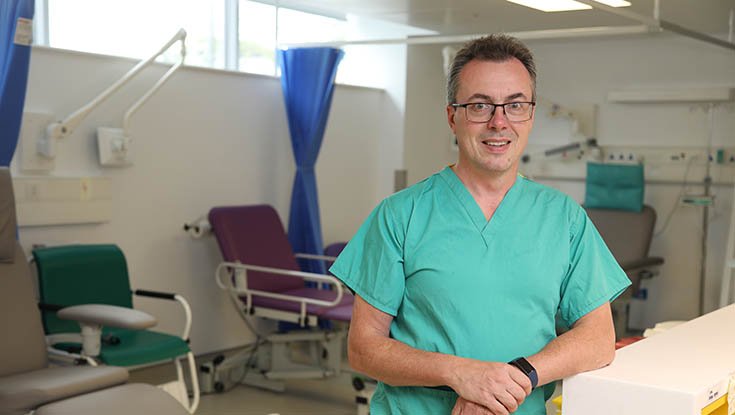
Image source: University of galway; credit - Aengus McMahon
News • Intensive care research
Safer ‘weaning’ of patients from ventilation to improve outcomes
A new global study involving ICUs across 50 countries recommends a systematic approach to reduce the duration of ventilation to improve risk of death.
The new study from University of Galway has found high death rates in weaning intensive care patients from ventilation. During this clinical study, carried out in 50 countries, 35% of patients who required ventilation for longer than two days could not be successfully weaned from invasive mechanical ventilation.
The WEAN SAFE study is the first global study to describe the weaning process in detail, characterising different approaches used by physicians in regard to weaning for mechanical ventilation, and the impact of delayed and failed weaning from ventilation, in patients requiring at least two days of invasive ventilation. The study was funded by the European Society of Intensive Care Medicine and by the European Respiratory Society, and performed by a consortium of investigators from 481 ICUs across 50 countries. The research was published recently in The Lancet Respiratory Medicine.
Despite the importance of the weaning process, this area is not well studied
John Laffey
Weaning in the context of invasive ventilation for ICU patients is the process of decreasing the degree of ventilator support and allowing the patient to take on a greater proportion of their ventilation independent of machinery - for example spontaneous breathing trials or a gradual reduction in machinery support. A patient is successfully weaned from invasive ventilation when the invasive ventilator support is completely removed. The study found that successful weaning of patients from invasive mechanical ventilation represents a crucial step in the recovery process following severe respiratory failure. Many of the serious complications of mechanical ventilation are directly related to the duration of ventilation.
Professor John Laffey, Professor of Anaesthesia and Intensive Care Medicine at University of Galway’s College of Medicine, Nursing and Health Sciences, and Consultant in Anaesthesia and Intensive Care Medicine at Galway University Hospitals, explained: “Where the process of weaning becomes prolonged, the risk of dying and of increased length of stay in intensive care and hospital increases substantially. In terms of longer term outcomes, older age and the duration of ventilation are the strongest predictors of survival and quality of life at one year following critical illness.” He added: “Despite the importance of the weaning process, this area is not well studied. Our research on this clinical practice is the largest study to date to offer data relating weaning practices to outcomes from invasive mechanical ventilation in a global cohort of patients at risk for prolonged weaning and/or weaning failure.”
It was found that of the patients enrolled in the study:
- 30% died in the ICU, while 38% died in hospital. Of patients who did not successfully wean from ventilation, 78% died in the ICU.
- Of patients who entered the weaning process, 65% had a short wean (≤1 day), 10% had intermediate (2-6 days) weaning, 10% had a prolonged (≥ 7 days) weaning duration, while 16% ultimately failed (i.e., died, were transferred or still invasively ventilated at day 90).
- Higher sedation levels were independently associated with delays in initiating weaning from the ventilator. Higher sedation levels and a delay in initiating ventilator separation were potentially modifiable factors independently associated with weaning failure.
Researchers involved in the global study said its findings can help shape clinical approaches relating to weaning from invasive mechanical ventilation. They also noted that future studies to develop strategies to reduce weaning delays, and optimize patient sedation levels, should improve survival in patients weaning from ventilation.
Source: University of Galway
25.01.2023










